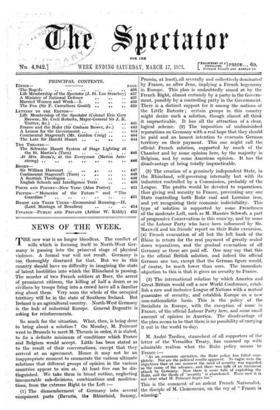• So much for the situation. What, then, is being
done to bring about a solution ? On Monday, M. Poineare went to Brussels to meet M. Theunis in order, it is stated, to fix 'a definite minimum of conditions which France and Belgium would accept. Little has been stated as to the result of their conversations, except that they arrived at an agreement. Hence it may not be an inappropriate moment to enumerate the various ultimate solutions that different groups of opinion in the various countries appear to aim at. At least five can be dis- tinguished. We take them in broad outline, neglecting innumerable sub-divisions, combinations and modifica- tiims, from the extreme Right to the Left (1) The dismemberment of Germany into several c6niptinent parts (Bavaria,. the. Rhineland, Saxony, Prussia, at least), all severally and collectively dominated by France, as after Jena, implying a French hegemony in Europe. This plan is undoubtedly aimed at by the French Right, almost certainly by a party in the Govern- ment, possibly by a controlling party in the GovernMent. There is a distinct support for it among the nations of the Little Entente ; certain groups in this country might desire such a solution, though almost all think it impracticable. It has all the attraction of a clear, logical scheme. (2) The imposition of undiminished reparations on Germany with a real hope that they should be paid and an honest intention to evacuate German territory on their payment. This one might call the official French solution, supported by much of the Chamber and by some opinion here, by the majority in Belgium, and by some American opinion. It has the disadvantage of being totally impracticable.
(3) The creation of a genuinely independent State, in the Rhineland, self-governing internally but with its industries controlled by a Commission, probably of the League. The profits would be devoted to reparations, thus giving real security to France, preventing any one State controlling both Ruhr coal and Lorraine iron, and yet recognizing their economic indivisibility. This type , of solution is supported by some Frenchmen of the moderate Left, such as M. Maurice Schwob, a part of progressive Conservatism in this country, and by some of the Labour Party who have been influenced by Mr. Maxwell and his friends' report on their Ruhr excursion. (4) French evacuation of all but the left bank of the Rhine in return for the real payment of greatly scaled down reparations, and the gradual evacuation of all Germany as these are paid off. One may say that this is the official British solution, and indeed the official German one too, except that the German figure would, of course, be much lower than ours. The immediate objection to this is that it gives no security to France.
(5) The international solution by which America and Great Britain would call a new World Conference, estab • lish a new and inclusive League of Nations with a mutual guarantee of security, and establish Europe on a new non-nationalistic basis. This is the policy of the Socialists in Europe, with the exception of some hi France, of the official Labour Fifty here, and some small amount of opinion in America. The disadvantage of the plan seems to be that there is no possibility of carrying it out in the world to-day.










































